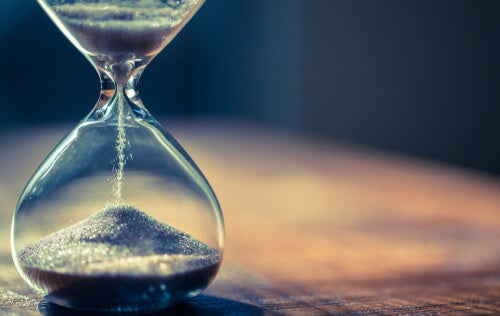Knowing How to Wait Takes Courage


Written and verified by the psychologist Sergio De Dios González
Knowing how to wait is important. Actually, you must wait as long as you need to for the seeds to sprout and grow, for the right feelings to appear, and for the universe’s signals. There’s a time and a rhythm for everything, even if you refuse to accept it. In fact, if you pause for a moment and look around you, you’ll see that everything continues to move in one way or another. It’s precisely this flow of life, its creative impulse to evolve, that nourishes everything you cultivate so you can eventually reap its benefits.
Waiting can be synonymous with boredom, laziness, and impatience. However, it’s also the prelude that gives you shelter. The art of patience takes you through a learning path. One could even say that waiting is the time it takes for the desire you plant to germinate and bear its fruit. You must keep in mind that it’s a slow process you can’t accelerate.
“A man who masters patience, masters everything else.”
-George Savile-
Knowing how to wait and the chaos of immediacy
Byung-Chul Han, a philosopher, expert in cultural studies, and a professor at the Berlin University of the Arts, wrote the book The Burnout Society. In it, he states that the society of the 21st century is no longer a disciplinary society. Instead, it’s focused on performance and the power to produce.
Today, people want to do more in less time. Everyone is rushed and under pressure in a world of excessive stimuli. One that’s more concerned with results than with enjoying the process. The problem is that you end up physically, mentally, and occupationally exhausted when you ignore the steps you take and how you got there.
In addition, stimulation affects perception. You multitask and do everything but nothing at the same time. In fact, according to Byung-Chul Han, multitasking doesn’t mean you’re making progress. It’s a regression because it doesn’t give you enough time for contemplation and to fully give tasks your attention. You live above, tiptoeing without immersing yourself in your experiences.

Immediacy
Nowadays, people don’t like to wait. In fact, it’s hard to be patient because you want everything immediately and quite impulsively. Most people seldom stop to measure the consequences and are overwhelmed by stress, anxiety, depression, and boredom. They don’t even enjoy their downtime. Most people are uncomfortable when they have nothing to do because they must confront themselves when they do. Unfortunately, very few of us are prepared to do so.
It’s almost as if boredom was an enemy. Thus, people rush into finding something to do and occupy their time. And in the midst of this noise, you may forget that pure excitement doesn’t create anything new. Thus, in turn, you lose the gift of listening, as philosopher Walter Benjamin affirms. Not only that, but you lose yourself in a spiral of hyperactivity, stress, and restlessness.
The pleasure of knowing how to wait
What would happen if you suddenly stopped? Might you discover something if you slow down? How would you feel if you stopped right on your tracks? Interrupting your speed is scary at first, there’s no denying it. It may even hurt you because you’re so used to immediacy.
Patience is an art you must learn based on training and tolerance towards ignorance and uncertainty. Since most people are terrified of waiting, it may be unbearable for you not to know what will happen. and what you’re going to lose control over. However, this is impossible to avoid at times. Thus, don’t forget that patience is related to being, while impatience is related to accumulating.
For a moment, think about how you feel when you’re in a situation that isn’t your responsibility but bothers you. Reflect on those times when you had an argument with someone you care about and how decisive it was for you both. It’s awkward, right? How do you feel when someone makes you wait?
Waiting is a challenge! However, most people consider patience a weakness. This is because, most of the time, they mistake it for giving up or for apathy. This is wrong, as patience has nothing to do with consciousness but with courage, hope, and a long-term perspective. Patience consists of rebelling against difficulties in different ways.

Final notes
Knowing how to wait consists of protecting yourself from the eventuality of immediacy and being able to experience adverse situations without collapsing. A patient person knows the pitfalls of impulsiveness and the consequences that derive from it. This is because they’ve tamed their relentless pursuit of pleasure and instant gratification.
Waiting can teach you that having everything under control is impossible and dangerous. Reflecting to understand and prioritize is an important attitude, and so is claiming time just for yourself. Time to inquire into what you want and where you’re going, to get some perspective on your path. Of course, this is only possible if you practice patience. Mainly because of the ability for careful evaluation while you’re calm and not clouded by the noise of need and immediate pleasure.
Being patient is learning not to get carried away by the circumstances, but knowing how to take action at the right time. Choosing and giving up while you’re calm. Learning the rhythm of life.
Knowing how to wait is important. Actually, you must wait as long as you need to for the seeds to sprout and grow, for the right feelings to appear, and for the universe’s signals. There’s a time and a rhythm for everything, even if you refuse to accept it. In fact, if you pause for a moment and look around you, you’ll see that everything continues to move in one way or another. It’s precisely this flow of life, its creative impulse to evolve, that nourishes everything you cultivate so you can eventually reap its benefits.
Waiting can be synonymous with boredom, laziness, and impatience. However, it’s also the prelude that gives you shelter. The art of patience takes you through a learning path. One could even say that waiting is the time it takes for the desire you plant to germinate and bear its fruit. You must keep in mind that it’s a slow process you can’t accelerate.
“A man who masters patience, masters everything else.”
-George Savile-
Knowing how to wait and the chaos of immediacy
Byung-Chul Han, a philosopher, expert in cultural studies, and a professor at the Berlin University of the Arts, wrote the book The Burnout Society. In it, he states that the society of the 21st century is no longer a disciplinary society. Instead, it’s focused on performance and the power to produce.
Today, people want to do more in less time. Everyone is rushed and under pressure in a world of excessive stimuli. One that’s more concerned with results than with enjoying the process. The problem is that you end up physically, mentally, and occupationally exhausted when you ignore the steps you take and how you got there.
In addition, stimulation affects perception. You multitask and do everything but nothing at the same time. In fact, according to Byung-Chul Han, multitasking doesn’t mean you’re making progress. It’s a regression because it doesn’t give you enough time for contemplation and to fully give tasks your attention. You live above, tiptoeing without immersing yourself in your experiences.

Immediacy
Nowadays, people don’t like to wait. In fact, it’s hard to be patient because you want everything immediately and quite impulsively. Most people seldom stop to measure the consequences and are overwhelmed by stress, anxiety, depression, and boredom. They don’t even enjoy their downtime. Most people are uncomfortable when they have nothing to do because they must confront themselves when they do. Unfortunately, very few of us are prepared to do so.
It’s almost as if boredom was an enemy. Thus, people rush into finding something to do and occupy their time. And in the midst of this noise, you may forget that pure excitement doesn’t create anything new. Thus, in turn, you lose the gift of listening, as philosopher Walter Benjamin affirms. Not only that, but you lose yourself in a spiral of hyperactivity, stress, and restlessness.
The pleasure of knowing how to wait
What would happen if you suddenly stopped? Might you discover something if you slow down? How would you feel if you stopped right on your tracks? Interrupting your speed is scary at first, there’s no denying it. It may even hurt you because you’re so used to immediacy.
Patience is an art you must learn based on training and tolerance towards ignorance and uncertainty. Since most people are terrified of waiting, it may be unbearable for you not to know what will happen. and what you’re going to lose control over. However, this is impossible to avoid at times. Thus, don’t forget that patience is related to being, while impatience is related to accumulating.
For a moment, think about how you feel when you’re in a situation that isn’t your responsibility but bothers you. Reflect on those times when you had an argument with someone you care about and how decisive it was for you both. It’s awkward, right? How do you feel when someone makes you wait?
Waiting is a challenge! However, most people consider patience a weakness. This is because, most of the time, they mistake it for giving up or for apathy. This is wrong, as patience has nothing to do with consciousness but with courage, hope, and a long-term perspective. Patience consists of rebelling against difficulties in different ways.

Final notes
Knowing how to wait consists of protecting yourself from the eventuality of immediacy and being able to experience adverse situations without collapsing. A patient person knows the pitfalls of impulsiveness and the consequences that derive from it. This is because they’ve tamed their relentless pursuit of pleasure and instant gratification.
Waiting can teach you that having everything under control is impossible and dangerous. Reflecting to understand and prioritize is an important attitude, and so is claiming time just for yourself. Time to inquire into what you want and where you’re going, to get some perspective on your path. Of course, this is only possible if you practice patience. Mainly because of the ability for careful evaluation while you’re calm and not clouded by the noise of need and immediate pleasure.
Being patient is learning not to get carried away by the circumstances, but knowing how to take action at the right time. Choosing and giving up while you’re calm. Learning the rhythm of life.
All cited sources were thoroughly reviewed by our team to ensure their quality, reliability, currency, and validity. The bibliography of this article was considered reliable and of academic or scientific accuracy.
- Byung-Chul Han. (2012) La sociedad del cansancio. Barcelona: Herder.
- Kundera, Milan (2001). La lentitud. Barcelona: Tustquets.
- Schweizer, Harold (2010). La espera. Melodías de la duración. Madrid: Sequitur.
This text is provided for informational purposes only and does not replace consultation with a professional. If in doubt, consult your specialist.







